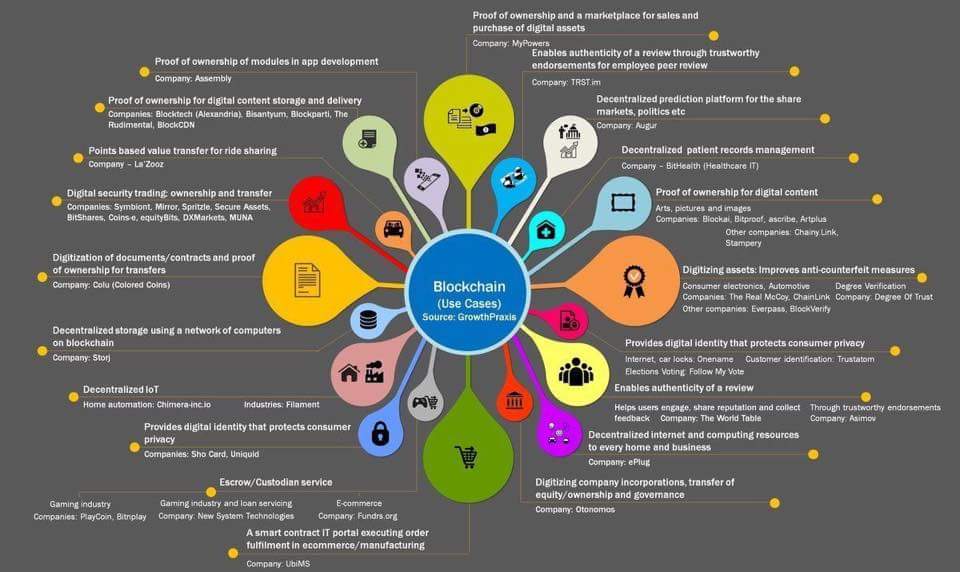Cryptocurrency | Blockchain | The Future
Blockchain and particularly the Bitcoin cryptocurrency have fascinated me since I first heard about them. They are a technology in their very infancy but have the potential to completely revolutionise the world. The Blockchain however has a major branding challenge on its hands. For the simple fact that I am willing to bet when you hear: blockchain, the very next thought is: Bitcoin. The fate the blockchain is categorically not dependant on the future of Bitcoin.
So what’s the difference?
This fantastic IBM video does a great job of explaining the difference of the two:
Think of the blockchain as the operating system and Bitcoin as one of the applications running on top of it. That is possibly the easiest way to describe the difference between the two.
Bitcoin
Let’s put this in perspective real quick. The Bitcoin cryptocurrency launched in 2009 and has had a relatively flat growth slope for most of that time. It is only in the last 6 months or so that this cryptocurrency has really seen massive growth. This is presumably as the market has begun to sit up and notice cryptocurrencies as more than a quick and passing fad.
![]()
There is a pretty famous story about someone in America who paid for pizza with Bitcoin in 2010. The story goes that the Bitcoin miner convinced someone the 10 000 coins he had mined were worth 2x pizzas. If he had have made that transaction today, those Bitcoin would have been worth: $41 066 800. Yip, that’s a sickening fourty one million Dollars. (Or about 2 560 000 pepperoni pizzas!) With growth of that size, cryptocurrencies have the potential to upend economies and create wealth out of nothing.
China
![]()



The recent upward trajectory of the cryptocurrency notwithstanding; Bitcoin has been in the news for the wrong reasons recently. (which explains the recent dip in the currency value over the last month or so). Most notably have been the Chinese blocking the cryptocurrency from being used as initial coin offerings (ICO).
This move certainly caused chaos among start-ups looking to raise money through the novel fund-raising scheme, prompting about-turns and many re-thinks.
China is not just cracking down on Bitcoin mind you. They are cracking down on fundraising through launches of token-based digital currencies, targeting ICOs in a market that has ballooned this year in what has been a bonanza for “digital currencyentrepreneurs”. While this might be a stumbling block for Bitcoin, ultimately it should be viewed in a positive light. The recent boom of cryptocurrencies has fuelled a jump in the value of and wide-spread acceptance of cryptocurrency, but raised fears of a potential bubble.
This move by China should not be seen as a knee-jerk reaction against cryptocurrencies, but rather as a hedge against another bubble burst which sent the financial sector into a tailspin!
JP Morgan
![]()
![]()
![]()
![]()
Adding to the Bitcoin firestorm was the Bloomberg article featuring JP Morgan CEO, Jamie Dimon saying that Bitcoin “is a fraud” and will eventually “blow up”. He went on to say that if a JP Morgan trader began trading in Bitcoin, “I’d fire them in a second. For two reasons: It’s against our rules, and they’re stupid. And both are dangerous.”
If you read the full article – leaving his tulip analogy aside – he goes on to echo what the Chinese are saying. We need to be prudent to avoid bubble burst. The world is only beginning to recover from the financial turmoil of 2008 that saw the Lehman Brothers and many other financial services firms close down.
The market at large did take notice of the warning from Jamie Dimon and the cryptocurrency dropped about 9% of its value in a little over 2 weeks.
Pick n Pay
![]()



What is interesting about the deployment at Pick n Pay is that the solution does not expose Pick n Pay to the fluctuations in the cryptocurrency. As soon as the funds move from the customers wallet to the Pick n Pay account, they are immediately converted into Rands. This places the risk squarely on the consumers shoulders in the sense that should they wish to pay with Bitcoin, their transaction price will be determined by the current trading value of the currency; which may have spiked or plummeted in the window from when they last looked at their account to when they authorised their transaction.
“At Pick n Pay, one of our key values is to embrace change and encourage innovation and leadership. To deliver on that promise, we are constantly working with our technology partners to find ways in which we can deliver valuable, innovative services to our customers,” says Jason Peisl, IS executive at Pick n Pay.
Holding The Bubbles Together
Personally I feel that this is the kind of main stream adoption that Bitcoin and the cryptocurrency industry have been waiting for. What I like about this solution is how it derisks the retailer and allows those who are familiar with the concept of cryptocurrency to transact with it. This is how you make a currency real. Up until now it has been a playground exercise to see who can stockpile the most coins.
When it becomes transaction-linked like this – people can get comfortable with it as another payment option and the currency gains traction.
The future of Bitcoin is certainly not clear; but it is definitely going to be fascinating to watch!
Blockchain
The platform has a pretty narrow application window in the minds of the majority of people. Pigeon-holed as the technology that underpins cryptocurrencies. The blockchain is so much more than that. It has the potential to go a lot further than just the financial services industry.
![]()



The top three use cases for the blockchain:
Digital identity
Imagine never having to worry about your digital security every again. Never having to worry about identity theft which is currently estimated to cost about $18.5 billion annually, according to a report released in 2016 by Distil Networks. In short this means that for every $3 spent, $1 is going to identity fraud.
The blockchain can make tracking and managing digital identities both secure and efficient, reducing fraud and enabling a truly single sign on.
Be it banking, healthcare, citizenship documentation or online shopping, identity authentication and authorization is intricately woven into commerce and culture across the world.
Blockchain technology offers a solution to many digital identity issues, where identity can be uniquely authenticated in an irrefutable, immutable, and secure manner. At the moment we are forced to remember and use problematic password-based systems that are stored on largely insecure systems. A blockchain-based authentication system would be based on irrefutable identity verification using digital signatures based on public key cryptography.
In blockchain identity authentication, the single check that needs to be performed is to find out whether the transaction was signed by the correct private key.
Blockchain technology can be applied to identity applications in the following areas:
- Digital Identities
- Passports
- Birth Certificates
- Wedding Certificates
- IDs
Smart Contracts
The world of smart contracts is fast approaching! But what is defined as a smart contract?
In short a smart contract is a legally binding programmable digitized contract that is entered on the blockchain. Developers implement legal contracts as variables and statements that can release funds using the Bitcoin network as a ‘3rd party executor’, rather than trusting a single central authority.
In other words, if two people want to exchange R100 at a specific time in future when a defined set of preconditions are met, the conditions, payout, and parties’ details would be programmed into a smart contract. Once the defined conditions are met, funds would be released and sent to the appropriate party as per terms.
“Smart contracts solve the problem of intermediary trust between parties to an agreement, whether that is between people transferring assets like gold, or executing decisions between two parties in a betting contract,” explained Vitalik Buterin, a founder of Ethereum.
Digital Voting
Arguably one of the favourite potential application of the blockchain. one of the greatest barriers to getting voting onto an electronic platform is the risk of identity fraud and the security of the voting record.
Using the blockchain, a voter could check that her or his vote was successfully transmitted while remaining completely anonymous to the rest of the world. There is a case from 2014 where Liberal Alliance, a Danish political party, became the first organization to use blockchain to vote.
This distributed electronic voting could engage voters to cast their ballots and also reduce counting errors whilst making the entire process from vote to result a far quicker process.
A team observing the 2013 municipal elections in Estonia – the only country to run Internet voting on a wide scale – reported that they observed election officials downloading key software over insecure Internet connections, typing PINs and passwords in view of cameras, and preparing election software on vulnerable PCs.
I truly believe that the blockchain will become the best practice method by which developed countries go to the polls.
So where does it all end?
While Bitcoin might not be the global currency or the future; there is certainly a very strong case that positions the blockchain as the driving force behind smart contracts and more in the future. The internet by its very nature is disruptive. As we enable more and more technologies to be connected to it; we are breaking business models and challenging the status quo. The blockchain powered Internet of Things future is around the corner. Middlemen, regulators and gatekeepers are going to be forced out of existence.
Technology is enabling business decisions to be less concerned with “how it has been done” and all consumed with “how it could be done”. This democratisation of information places your brand reputation directly in the path of destruction.
[Tweet “Where technology, design and strategy come together – that is the nexus of your brand!”]If your brand is not seen as being relevant; you are already dead.
